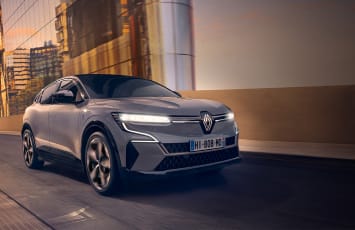

Confused about electrified powertrains?
Renault is here to help. It’s 12 years since the introduction of the Renault Zoe E-Tech 100% electric, and Renault has now sold 34,000* EVs in the UK. Read on to discover all about petrol alternatives with E-Tech 100% electric and E-Tech hybrid.
Who is E-Tech 100% electric for?
If you want an eco-friendly car that produces zero exhaust emissions(1), then an EV is currently the only solution. Instant acceleration and quieter, smoother performance are key advantages for both everyday driving and longer trips, but where you live, how you use your car and in particular the charging of your EV, can have a large influence on the experience of owning one.
Which vehicles are 100% electric?
Renault offers a broad range of EVs, from superminis to family cars and eLCVs. These include the Megane, Kangoo and Master, Scenic, as well as the upcoming Renault 5.
Who are hybrids for?
Hybrids offer the advantages of electric drive while still providing the reassurance of a petrol engine when needed. However, not all hybrids are the same: the key differentiators are the size of battery (kWh), the electric motor power (kW) and whether you need to plug them in to charge them.
E-Tech full hybrid
This effectively offers two sources of energy to help keep you moving: the E-Tech full hybrid technology converts the energy recovered during braking (known as kinetic energy) to self-charge a powerful battery (400V), meaning you don’t plug it in. It helps to reduce petrol consumption compared to an equivalent vehicle with just an internal combustion engine(2) and can be a more efficient solution for those who are not yet ready to make the switch to all-electric power.
Which vehicles are full hybrid?
The full hybrid models that Renault offer are Austral, Arkana, Clio E-Tech and Captur and the
upcoming Rafale.
E-Tech plug-in hybrid
The higher capacity battery in the plug-in hybrid model can store more energy, in comparison to a full hybrid battery version, allowing you to cover some journeys in full electric mode. The electric engine is used exclusively during start-up and the vehicle switches to hybrid based on the driving conditions. To maximise efficiency, it is best to plug in whenever the battery is depleted, but it’s not essential.
Ready to join the revolution?
Renault understands it can be a big shift to transition to 100% electric, which is why Renault has developed two distinct ranges so that everyone can go at their own speed.
Rather than taking a generic approach to the two ranges, Renault has designed these cars specifically based on their engine technologies to optimise their weight, efficiency, and performance, so you’ll find an electric or hybrid car to perfectly suit your needs.
*34,458 Renault electric vehicle sales in the UK between 2012-2023. Figures correct at time of publishing.
(1) The official CO2 emissions for the Renault range (electric, hybrid and petrol) are 0-133g/km. WLTP figures shown are for comparability purposes. Actual real world driving results may vary depending on factors including the starting charge of the battery, accessories fitted after registration, weather conditions, driving styles and vehicle load.
(2) WLTP mpg figures for the Renault hybrid range at 57.6-67.3mpg compared to the Renault petrol range at 47.9-54.3mpg. Real world driving results may vary.